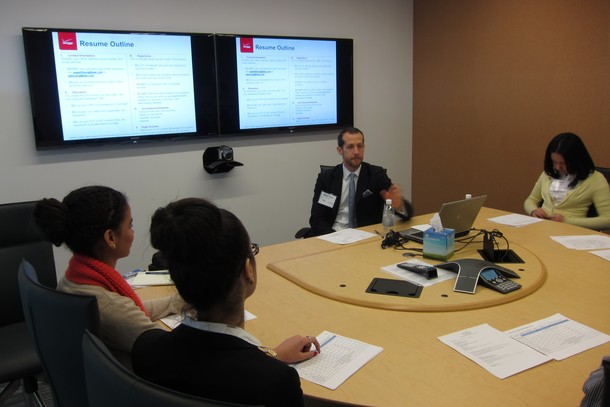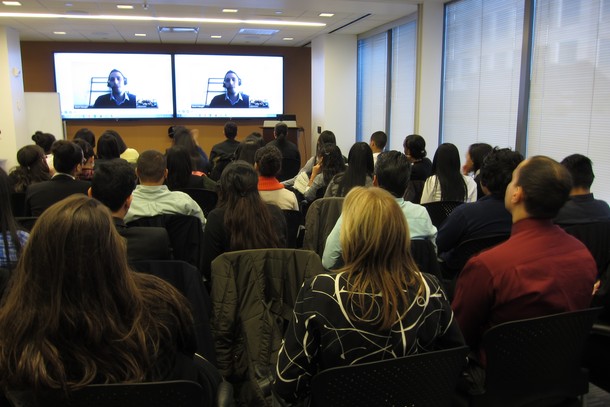Juniper Networks and Verizon Continue to Foster Student Success

Thirty high school juniors received advice for succeeding in the job market during a “soft skills” mentoring workshop at Juniper Networks OpenLab (Bridgewater) on Jan. 13.
The workshop focused on topics like job hunting, résumé writing, and communication skills. It was organized by Juniper, Verizon and the National Academy Foundation, a nonprofit organization (naf.org) designed to prepare students for success in college and the workforce.
The workshop was one of several events in an experiential work-based learning program for students from New York City’s Manhattan Bridges High School, a NAF school
The bilingual high school caters to Spanish-speaking students for whom English is a second language.
The NAF staff works with the administration at Manhattan Bridges, and they select the students for participation in the program. These students have typically shown an interest in STEM fields, although they have not necessarily committed to working in those areas.
“Students tell us that the program gives them a better understanding about the skills and education they need to secure STEM jobs, and an understanding in what it would be like to work for Verizon or Juniper, ” said, Jayne Mayer, director of employee engagement and volunteering at the Verizon Foundation. “The school faculty tells us that the program also helps to build students’ self-confidence while providing practical application to what they are learning in school.”
The workshop started at 10:15 a.m., when students were welcomed by Jerry Passione, general manager of OpenLab, and Vince Morreale, vice president and global client director at Juniper Networks.
The session focused on developing the students’ “soft skills,” and Passione emphasized the importance of sales and communication skills when he addressed the students. He said the workshop was designed to help build these skills because students should think of themselves as a “product” they are trying to sell to prospective employers. “Nobody can sell you better than you,” he said, urging students to be proactive so as to better position themselves.
Morreale gave the students advice for setting goals. He said that goals should be specific, measurable, reasonable and time-bound. “Don’t let a goal get out of reach,” he said, suggesting that students should instead aim to find work within three to six months after graduating from college. Morreale also emphasized the importance of working hard and taking responsibility for reaching those goals.
After Morreale’s remarks, the students split into five smaller groups, which rotated through different areas of Juniper’s office to learn about various topics in 15-minute sessions.
These sessions included a job-search discussion, general résumé writing tips, individualized résumé feedback, one-on-one mock interviews, and a tour of the networking equipment lab.
During the job-search discussion, Carol Zamprogna, a talent acquisition manager at Juniper, gave the students advice on finding work. Among other tips, she told the students they may already have skills, contacts and resources that could be helpful in a job search. “Having the ability to speak two languages is a widely sought-after skill set,” she told the group.

The résumé-writing session was led by Bruce Soltys, a senior human resources program manager at Verizon. He told the students that “an interview is telling people, colleges, organizations, and others about yourself and the skills and experience you possess. Your résumé serves as the script.”
Soltys advised students to write an “accomplishment résumé” instead of a “description résumé.” For example, writing “I ran a monthly council meeting” is OK, but not particularly effective. Conversely, writing “I ran a monthly council meeting and raised attendance by 25 percent,” demonstrates accomplishment and makes a résumé stand out.
The students, who had initially found résumé writing to be difficult, thought the session was helpful.
Towards the end of the workshop, students participated in a video call with Munir Dabaghi Richerand, a Juniper employee who lives and works in Mexico. He opened the call by greeting the students in Spanish, and then switched to English.
Dabaghi shared his experiences as a systems engineer. He emphasized the importance of communication skills, explaining that his job requires a mix of sales and technical expertise because it often involves interacting with customers. He also told the students that his job requires him to stay up-to-date on technology news and developments.
Students got the opportunity to ask Dabaghi a number of questions about his career and education. For instance, they asked how he chose his career, what challenges he faced in college, what his first job was after graduation, and how he learned about Juniper.
Other events in this year’s work-based learning program include:
- A tour of Verizon’s office in Basking Ridge, New Jersey, that included a speed networking event, a hands-on engineering project, and a community service project
- An introduction-to-programming event at the school, delivered in conjunction with code.org
- An educational session about big data and analytics
- A “college insights” workshop where representatives from local colleges and universities explain campus life, admissions requirements and tips for succeeding in college
- A celebratory party that encourages more networking and recaps the information covered in the earlier sessions
“These are ongoing interactions that we have with the same 30 students from this NAF academy,” Verizon’s Mayer told NJTechWeekly.com. “We meet with them about once a month, and we do a different type of activity that’s focused on career and college readiness. At Verizon, our focus is on getting students interested in STEM-related fields”.
This is the second year in a row that Juniper, Verizon, and NAF have organized the experiential work-based learning program. NJTechWeekly.com‘s coverage of last year’s program, which catered to another group of students from Manhattan Bridges High School, can be found here.

